- Home
- Daniel Quinn
Ishmael i-1 Page 14
Ishmael i-1 Read online
Page 14
“But it’s not going to be this easy for the Takers. It’s going to be hard as hell for them to give it up, because what they’re doing is right, and they have to go on doing it even if it means destroying the world and mankind with it.”
“Yes, that’s the way it seems.”
“Giving it up would mean… what?”
“Giving it up would mean… It would mean that all along they’d been wrong. It would mean that they’d never known how to rule the world. It would mean… relinquishing their pretensions to godhood.”
“It would mean spitting out the fruit of that tree and giving the rule of the world back to the gods.”
“Yes.”
9
Ishmael nodded to the stack of bibles at my feet. “According to the authors of that story, the people living between the Tigris and Euphrates rivers had eaten at the gods’ own tree of knowledge. Where do you suppose they got that idea?”
“What do you mean?”
“Whatever gave the authors of this story the idea that the people living in the Fertile Crescent had eaten at the gods’ tree of knowledge? Do you suppose they saw it with their own eyes? Do you suppose they were there when your agricultural revolution began?”
“I suppose that’s a possibility.”
“Think. If they’d been there to see it with their own eyes, who would they have been?”
“Oh… right. They would have been the people of the Fall. They would have been the Takers.”
“And if they’d been Takers, they would have told the story a different way.”
“Yes.”
“So the authors of this story were not there to see it with their own eyes. How then did they know it had happened? How did they know that the Takers had usurped the role of the gods in the world?”
“Lord,” I said.
“Who were the authors of this story?”
“Well… the Hebrews?”
Ishmael shook his head. “Among the people known as the Hebrews, this was already an ancient story—and a mysterious story. The Hebrews stepped into history as Takers—and wanted nothing more than to be like their Taker neighbors. Indeed, that’s why their prophets were always bawling them out.”
“True.”
“So, though they preserved the story, they no longer fully understood it. To find the people who understood it, we have to find its authors. And who were they?”
“Well… they were the ancestors of the Hebrews.”
“But who were they?”
“I’m afraid I have no idea.”
Ishmael grunted. “Look, I can’t forbid you to say, ‘I have no idea,’ but I do insist that you spend a few seconds thinking before you say it.”
I spent a few seconds at it, just to be polite, then I said, “I’m sorry. My grasp of ancient history is frankly negligible.”
“The ancient ancestors of the Hebrews were the Semites.”
“Oh.”
“You knew that, didn’t you?”
“Yes, I guess so. I just…”
“You just weren’t thinking.”
“Right.”
Ishmael bestirred himself, and to be perfectly honest, my stomach clenched as the half ton of him brushed past my chair. If you don’t know how gorillas make their way from place to place on the ground, you can visit the zoo or rent a National Geographic videotape; no words of mine will make you see it.
Ishmael lumbered or shambled or shuffled over to the bookcase and returned with an historical atlas, which he handed to me open to a map of Europe and the Near East in 8500 B.C. A blade like a hand sickle very nearly cut the Arabian peninsula away from the rest. The words Incipient Agriculture made it clear that the sickle blade enclosed the Fertile Crescent. A handful of dots indicated sites where early farming implements had been found.
“This map, I feel, gives a false impression,” Ishmael said, “though it was not an intended impression. It gives the impression that the agricultural revolution took place in an empty world. This is why I prefer my own map.” He opened his pad and showed it to me.
“As you see, this shows the situation five hundred years later. The agricultural revolution is well under way. The area in which farming is taking place is indicated by these hen–scratches.” Using a pencil as a pointer, he indicated the area between the Tigris and the Euphrates. “This, of course, is the land between the rivers, the birthplace of the Takers. And what do you suppose all these dots represent?”
“Leaver peoples?”
“Exactly. They’re not designed as a statement about population density. Nor are they intended to indicate that every available stretch of land was inhabited by some Leaver people. What they indicate is that this was far from being an empty world. Do you see what I’m showing you?”
“Well, I think so. The land of the Fall lay within the Fertile Crescent and was surrounded by nonagriculturalists.”
“Yes, but I’m also pointing out that at this time, at the beginning of your agricultural revolution, these early Takers, the founders of your culture, were unknown, isolated, unimportant. The next map in that historical atlas is four thousand years later. What would you expect to see on it?”
“I’d expect to see that the Takers have expanded.” He nodded, indicating that I should turn the page. Here a printed oval, labeled Chalcolithic Cultures, with Mesopotamia at its center, enclosed the whole of Asia Minor and all the land to the north and east as far as the Caspian Sea and the Persian Gulf. The oval extended southward as far as the entrance to the Arabian peninsula, which was a cross–hatched area labeled Semites.
“Now,” Ishmael said, “we have some witnesses.”
“How so?”
“The Semites were not eyewitnesses to the events described in chapter three of Genesis.” He drew a small oval in the center of the Fertile Crescent. “Those events, cumulatively known as the Fall, took place here, hundreds of miles north of the Semites, among an entirely different people. Do you see who they were?”
“According to the map, they were the Caucasians.”
“But now, in 4500 B.C., the Semites are eyewitnesses to an event in their own front yard: the expansion of the Takers.”
“Yes, I see.”
“In four thousand years the agricultural revolution that began in the land between the rivers had spread across Asia Minor to the west and to the mountains in the north and east. And to the south it seems to have been blocked by what?”
“By the Semites, apparently.”
“Why? Why were the Semites blocking it?”
“I don’t know.”
“What were the Semites? Were they agriculturalists?”
“No. The map makes it clear that they weren’t a part of what was going on among the Takers. So I assume they were Leavers.”
“Leavers, yes, but no longer hunter–gatherers. They had evolved another adaptation that was to be traditional for Semitic peoples.”
“Oh. They were pastoralists.”
“Of course. Herders.” He indicated the border between the Takers’ Chalcolithic Culture and the Semites. “So what was happening here?”
“I don’t know.”
Ishmael nodded toward the bibles at my feet. “Read the story of Cain and Abel in Genesis and then you’ll know.”
I picked up the one on top and turned to chapter four. A couple minutes later, I muttered, “Good lord.”
10
After reading the story in all three versions, I looked up and said, “What was happening along that border was that Cain was killing Abel. The tillers of the soil were watering their fields with the blood of Semitic herders.”
“Of course. What was happening there was what has always happened along the borders of Taker expansion: The Leavers were being killed off so that more land could be put under cultivation.” Ishmael picked up his pad and opened it to his own map of this period. “As you see, the hen–scratches of the agriculturalists have swarmed over the entire area—except for the territory occupied by the Semites. Here at
the border that separates tillers of the soil from Semitic herders, Cain and Abel confront each other.”
I studied the map for a few moments and then shook my head. “And biblical scholars don’t understand this?”
“I cannot say, of course, that not a single scholar has ever understood this. But most read the story as if it were set in an historical never–never land, like one of Aesop’s fables. It would scarcely occur to them to understand it as a piece of Semitic war propaganda.”
“That’s what it is, all right. I know it’s always been a mystery as to why God accepted Abel and his offering and rejected Cain and his offering. This explains it. With this story, the Semites were telling their children, ‘God is on our side. He loves us herders but hates those murderous tillers of the soil from the north.’ ”
“That’s right. If you read it as a story that originated among your own cultural ancestors, it’s incomprehensible. It only begins to make sense when you realize that it originated among the enemies of your cultural ancestors.”
“Yes.” I sat there blinking for a few moments, then looked at Ishmael’s map again. “If the tillers of the soil from the north were Caucasians,” I said, “then the mark of Cain is this.” I pointed to my own fair or maggot–colored face.
“It could be. Obviously we’ll never know for sure what the authors of the story had in mind.”
“But it makes sense this way,” I insisted. “The mark was given to Cain as a warning to others: ‘Leave this man alone. This is a dangerous man, one who exacts a sevenfold vengeance.’ Certainly a lot of people all over the world have learned that it doesn’t pay to mess with people with white faces.”
Ishmael shrugged, unconvinced or perhaps just uninterested.
11
“In the previous map, I went to the trouble of laying down hundreds of dots to represent Leaver peoples living in the Mideast when your agricultural revolution began. What do you suppose happened to these peoples between the time of that map and the time of this map?”
“I would have to say that either they were overrun and assimilated or they took up agriculture in imitation of the Takers.”
Ishmael nodded. “Doubtless many of these peoples had their own tales to tell of this revolution, their own ways of explaining how these people from the Fertile Crescent came to be the way they were, but only one of these tales survived—the one told by the Semites to their children about the Fall of Adam and the slaughter of Abel by his brother Cain. It survived because the Takers never managed to overrun the Semites, and the Semites refused to take up the agricultural life. Even their eventual Taker descendants, the Hebrews, who preserved the story without fully understanding it, couldn’t work up any enthusiasm for the peasant life–style. And this is how it happened that, with the spread of Christianity and of the Old Testament, the Takers came to adopt as their own a story an enemy once told to denounce them.”
12
“So we come again to this question: Where did the Semites get the idea that the people of the Fertile Crescent had eaten at the gods’ own tree of knowledge?”
“Ah,” I said. “I would say it was a sort of reconstruction. They looked at the people they were fighting and said, ‘My God, how did they get this way?’ ”
“And what was their answer?”
“Well… ‘What’s wrong with these people? What’s wrong with our brothers from the north? Why are they doing this to us? They act like…’ Let me think about this for a bit.”
“Take your time.”
“Okay,” I said a few minutes later. “Here’s how it would look to the Semites, I think. ‘What’s going on here is something wholly new. These aren’t raiding parties. These aren’t people drawing a line and baring their teeth at us to make sure we know they’re there. These guys are saying… Our brothers from the north are saying that we’ve got to die. They’re saying Abel has to be wiped out. They’re saying we’re not to be allowed to live. Now that’s something new, and we don’t get it. Why can’t they live up there and be farmers and let us live down here and be herders? Why do they have to murder us?’
“ ‘Something really weird must have happened up there to turn these people into murderers. What could it have been? Wait, a second… Look at the way these people live. Nobody has ever lived this way before. They’re not just saying that we have to die. They’re saying that everything has to die. They’re not just killing us, they’re killing everything. They’re saying, “Okay, lions, you’re dead. We’ve had it with you. You’re out of here.” They’re saying, “Okay, wolves, we’ve had it with you too. You’re out of here.” They’re saying… “Nobody eats but us. All this food belongs to us and no one else can have any without our permission.” They’re saying, “What we want to live lives and what we want to die dies.”
“ ‘That’s it! They’re acting as if they were the gods themselves. They’re acting as if they eat at the gods’ own tree of wisdom, as though they were as wise as the gods and could send life and death wherever they please. Yes, that’s it. That’s what must have happened up there. These people found the gods’ own tree of wisdom and stole some of its fruit.
“ ‘Aha! Right! These are an accursed people! You can see that right off the bat. When the gods found out what they’d done, they said, “Okay, you wretched people, that’s it for you! We’re not taking care of you anymore. You’re out. We banish you from the garden. From now on, instead of living on our bounty, you can wrest your food from the ground by the sweat of your brows.” And that’s how these accursed tillers of the soil came to be hunting us down and watering their fields with our blood.’ ”
When I finished, I saw that Ishmael was putting his hands together in mute applause.
I replied with a smirk and a modest nod.
13
“One of the clearest indications that these two stories were not authored by your cultural ancestors is the fact that agriculture is not portrayed as a desirable choice, freely made, but rather as a curse. It was literally inconceivable to the authors of these stories that anyone would prefer to live by the sweat of his brow. So the question they asked themselves was not, ‘Why did these people adopt this toilsome life–style?’ It was, ‘What terrible misdeed did these people commit to deserve such a punishment? What have they done to make the gods withhold from them the bounty that enables the rest of us to live a carefree life?’ ”
“Yes, that’s obvious now. In our own cultural history, the adoption of agriculture was a prelude to ascent. In these stories, agriculture is the lot of the fallen.”
14
“I have a question,” I said. “Why did they describe Cain as Adam’s firstborn and Abel as Adam’s secondborn?”
Ishmael nodded. “The significance is mythological rather than chronological. I mean that you’ll find this motif in folktales everywhere: When you have a father with two sons, one worthy and one unworthy, the unworthy son is almost always the cherished firstborn, while the worthy son is the secondborn—which is to say, the underdog in the story.”
“Okay. But why would they think of themselves as descendants of Adam at all?”
“You mustn’t confuse metaphorical thinking with biological thinking. The Semites didn’t think of Adam as their biological ancestor.”
“How do you know that?”
Ishmael thought for a moment. “Do you know what Adam means in Hebrew? We can’t know the name the Semites gave him, but presumably it had the same meaning.”
“It means man.”
“Of course. The human race. Do you suppose the Semites thought that the human race was their biological ancestor?”
“No, of course not.”
“I agree. The relationships in the story have to be understood metaphorically, not biologically. As they perceived it, the Fall divided the race of man into two—into bad guys and good guys, into tillers of the soil and herders, the former bent on murdering the latter.”
“Okay,” I said.
15
“But I’m
afraid I have another question.”
“There’s no need to apologize for it. That’s what you’re here for.”
“Okay. My question is, how does Eve figure in all this?”
“Her name means what?”
“According to the notes, it means Life.”
“Not Woman?”
“No, not according to the notes.”
“With this name, the authors of the story have made it clear that Adam’s temptation wasn’t sex or lust or uxoriousness. Adam was tempted by Life.”
“I don’t get it.”
“Consider: A hundred men and one woman does not spell a hundred babies, but one man and a hundred women does.”
“So?”
“I’m pointing out that, in terms of population expansion, men and women have markedly different roles. They’re by no means equal in this regard.”
“Okay. But I still don’t get it.”
“I’m trying to put you in the frame of mind of a nonagricultural people, a people for whom population control is always a critical problem. Let me put it baldly: A band of herders that consists of fifty men and one woman is in no danger of experiencing a population explosion, but a band that consists of one man and fifty women is in big trouble. People being people, that band of fifty–one herders is going to be a band of one hundred in no time at all.”
“True. But I’m afraid I still don’t see how this relates to the story in Genesis.”
“Be patient. Let’s go back to the authors of this story, a herding people being pushed into the desert by agriculturalists from the north. Why were their brothers from the north pushing?”

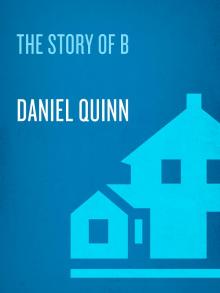 The Story of B
The Story of B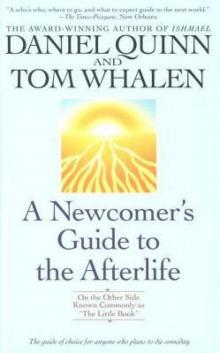 A Newcomer's Guide to the Afterlife: On the Other Side Known Commonly as the Little Book
A Newcomer's Guide to the Afterlife: On the Other Side Known Commonly as the Little Book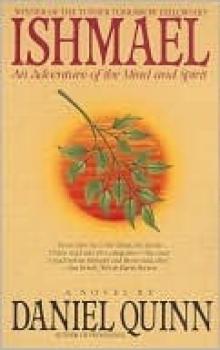 Ishmael: An Adventure of the Mind and Spirit
Ishmael: An Adventure of the Mind and Spirit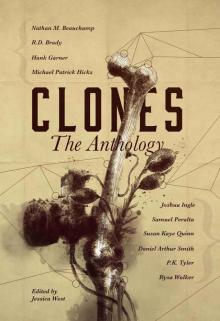 CLONES: The Anthology
CLONES: The Anthology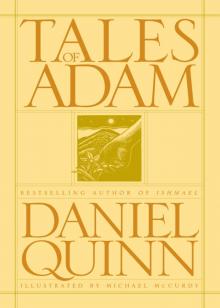 Tales of Adam
Tales of Adam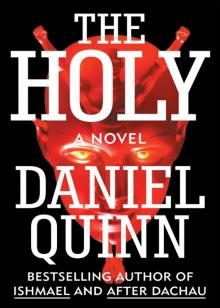 The Holy
The Holy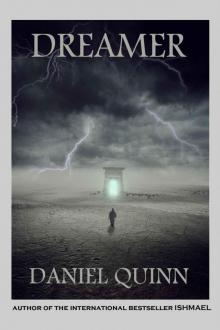 Dreamer
Dreamer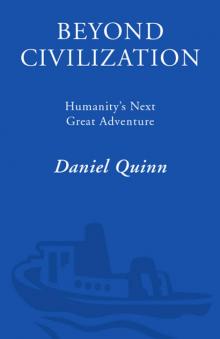 Beyond Civilization: Humanity's Next Great Adventure
Beyond Civilization: Humanity's Next Great Adventure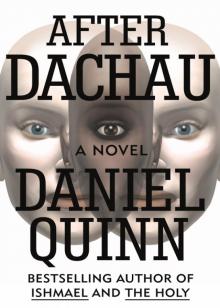 After Dachau
After Dachau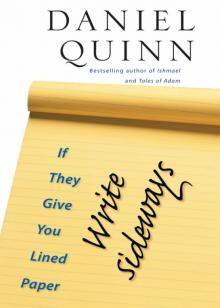 If They Give You Lined Paper, Write Sideways.
If They Give You Lined Paper, Write Sideways.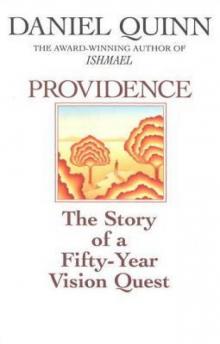 Providence
Providence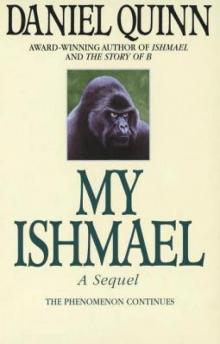 My Ishmael
My Ishmael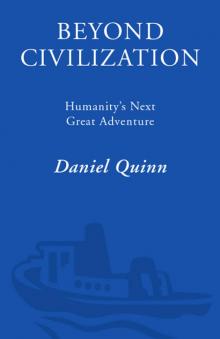 Beyond Civilization
Beyond Civilization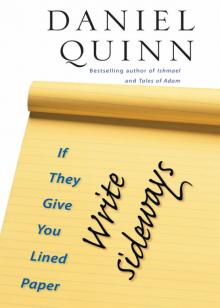 If They Give You Lined Paper, Write Sideways
If They Give You Lined Paper, Write Sideways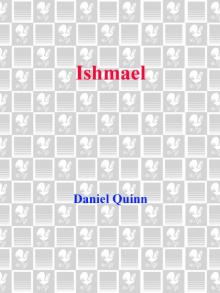 Ishmael
Ishmael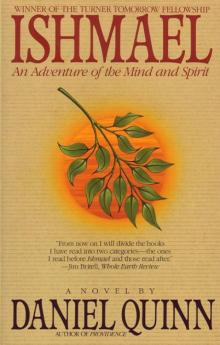 Ishmael i-1
Ishmael i-1 A Newcomer's Guide to the Afterlife
A Newcomer's Guide to the Afterlife